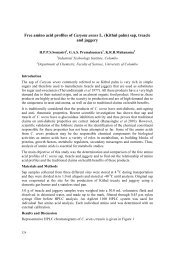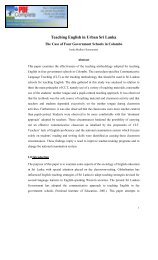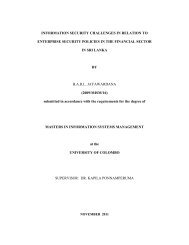inclusive education for disabled children in sri lanka - University of ...
inclusive education for disabled children in sri lanka - University of ...
inclusive education for disabled children in sri lanka - University of ...
Create successful ePaper yourself
Turn your PDF publications into a flip-book with our unique Google optimized e-Paper software.
INCLUSIVE EDUCATIONFOR DISABLED CHILDREN IN SRI LANKA:ISSUES AND CHALLENGESA.S. ILANGAMGE2007/MDS/19MASTERS IN DEVEPLOMENT STUDIES -2007/2008FACULTY OF GRADUATE STUDIESUNIVERSITY OF COLOMBO
TABSTRACTInclusionis a process relevant to all <strong>children</strong> <strong>in</strong> a school where <strong>disabled</strong> <strong>children</strong> too givenopportunityto study <strong>in</strong> a normal school. Based particularly on the per<strong>for</strong>mance <strong>of</strong> the<strong>disabled</strong> groups who have historically been marg<strong>in</strong>alized or have underachieved <strong>in</strong>traditionalschools, the concept <strong>of</strong> <strong><strong>in</strong>clusive</strong> <strong>education</strong> emerged <strong>in</strong> the last quarter <strong>of</strong> the20thcentury,and was promoted by <strong>in</strong>ternationalconventions. In keep<strong>in</strong>g with world trends,SriLankahas implemented the concept <strong>of</strong> <strong><strong>in</strong>clusive</strong> <strong>education</strong> us<strong>in</strong>g different <strong>in</strong>terventionprogrammesbut the present position was not studied <strong>in</strong> depth to access the knowledge,atta<strong>in</strong>ments.The specificobjectives <strong>of</strong> the present study were to synthesize secondary data on <strong>disabled</strong><strong>children</strong>'s <strong>education</strong>; to identify the prevalence situation; to review the <strong>education</strong>al policyon <strong><strong>in</strong>clusive</strong><strong>education</strong>; and to f<strong>in</strong>d out parent' and teacher' perceptions on the issue. TheSurveyResearch method was used. Focus group <strong>in</strong>terviews and case studies on eight<strong>children</strong>were conducted us<strong>in</strong>g the data collection techniques. Data were analysed us<strong>in</strong>gdescriptivestatistics. Accord<strong>in</strong>g to the f<strong>in</strong>d<strong>in</strong>gs, there was no proper policy to specificallyaddressthe issue <strong>of</strong> admitt<strong>in</strong>g <strong>children</strong> with disabilities to schools. No balanced policy tocover all types <strong>of</strong> disabilities was observed. Lack <strong>of</strong> awareness and negative attitudesamongschool and other communities concern<strong>in</strong>g <strong>disabled</strong> <strong>children</strong> was evident. There is agap between policies and practices on <strong>disabled</strong> <strong>children</strong>. No curriculum policy to addressall types <strong>of</strong> disabilities was seen. No proper method <strong>for</strong> evaluation and monitor<strong>in</strong>g <strong>of</strong><strong>education</strong>alprogrammes <strong>for</strong> <strong>disabled</strong> <strong>children</strong> also was observed. Lack <strong>of</strong> physical andhuman facilities resulted <strong>in</strong> poor achievements <strong>of</strong> <strong>children</strong> with disabilities. Lack <strong>of</strong>coord<strong>in</strong>ationamong <strong>in</strong>stitutionsh<strong>in</strong>ders the development<strong>of</strong> <strong>children</strong> with disabilities.The study suggests the importance <strong>of</strong> clarify<strong>in</strong>g and revis<strong>in</strong>g the exist<strong>in</strong>g policy,<strong>in</strong>troduc<strong>in</strong>g an <strong>education</strong> policy <strong>for</strong> quality <strong>education</strong> and implement<strong>in</strong>g it <strong>in</strong> thebeneficiary friendly manner. Policies and programmes should be<strong>for</strong>mulated andimplemented <strong>for</strong> the <strong>children</strong> <strong>in</strong> the age group <strong>of</strong> 0-10. Government organizations mustreconsider their policies and practices concern<strong>in</strong>g <strong>disabled</strong> <strong>children</strong>. Importance <strong>of</strong>strengthen<strong>in</strong>g l<strong>in</strong>ks between families <strong>of</strong> <strong>disabled</strong> <strong>children</strong> and organizations has beenstressed as a necessity.Vlll





